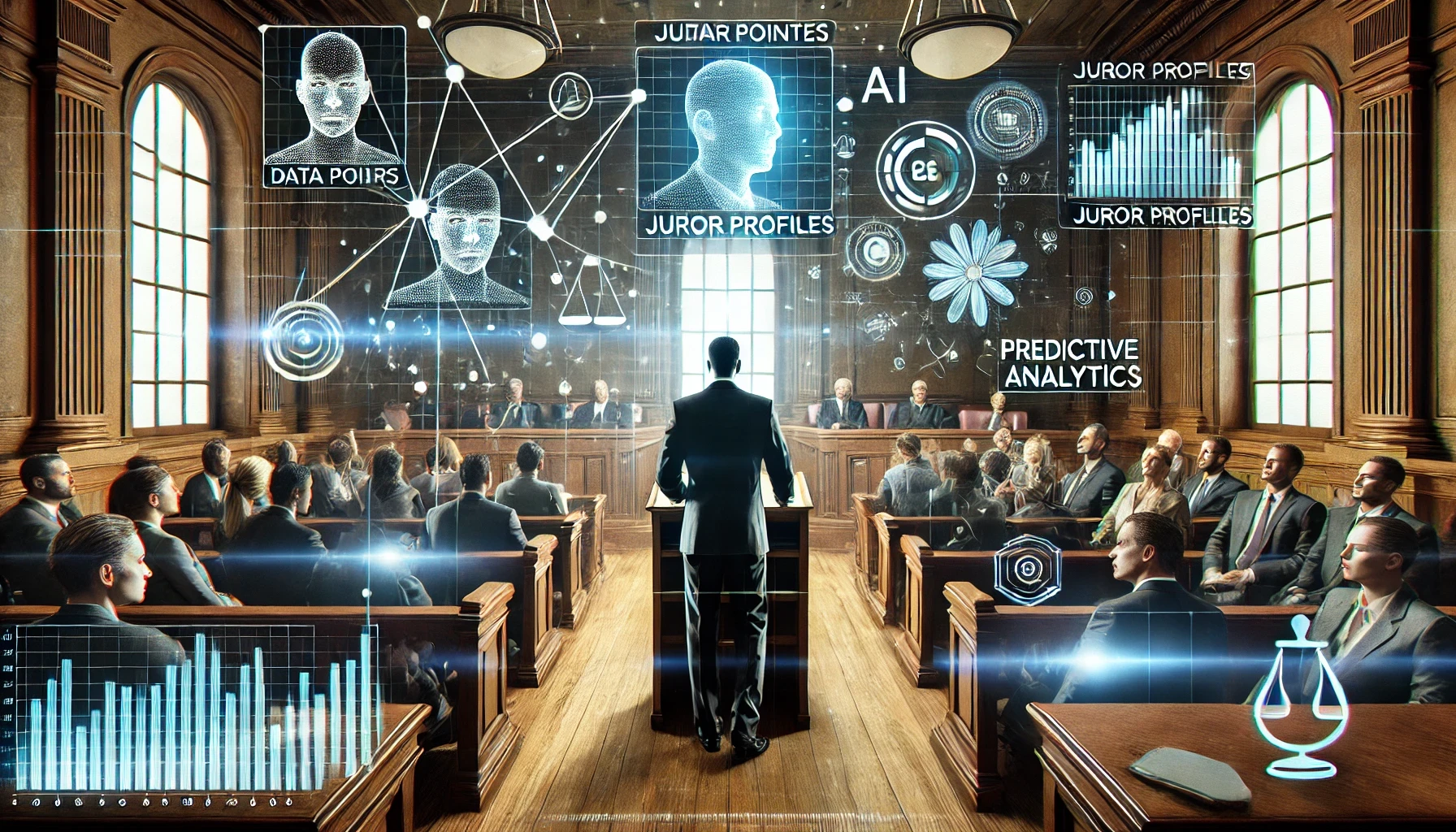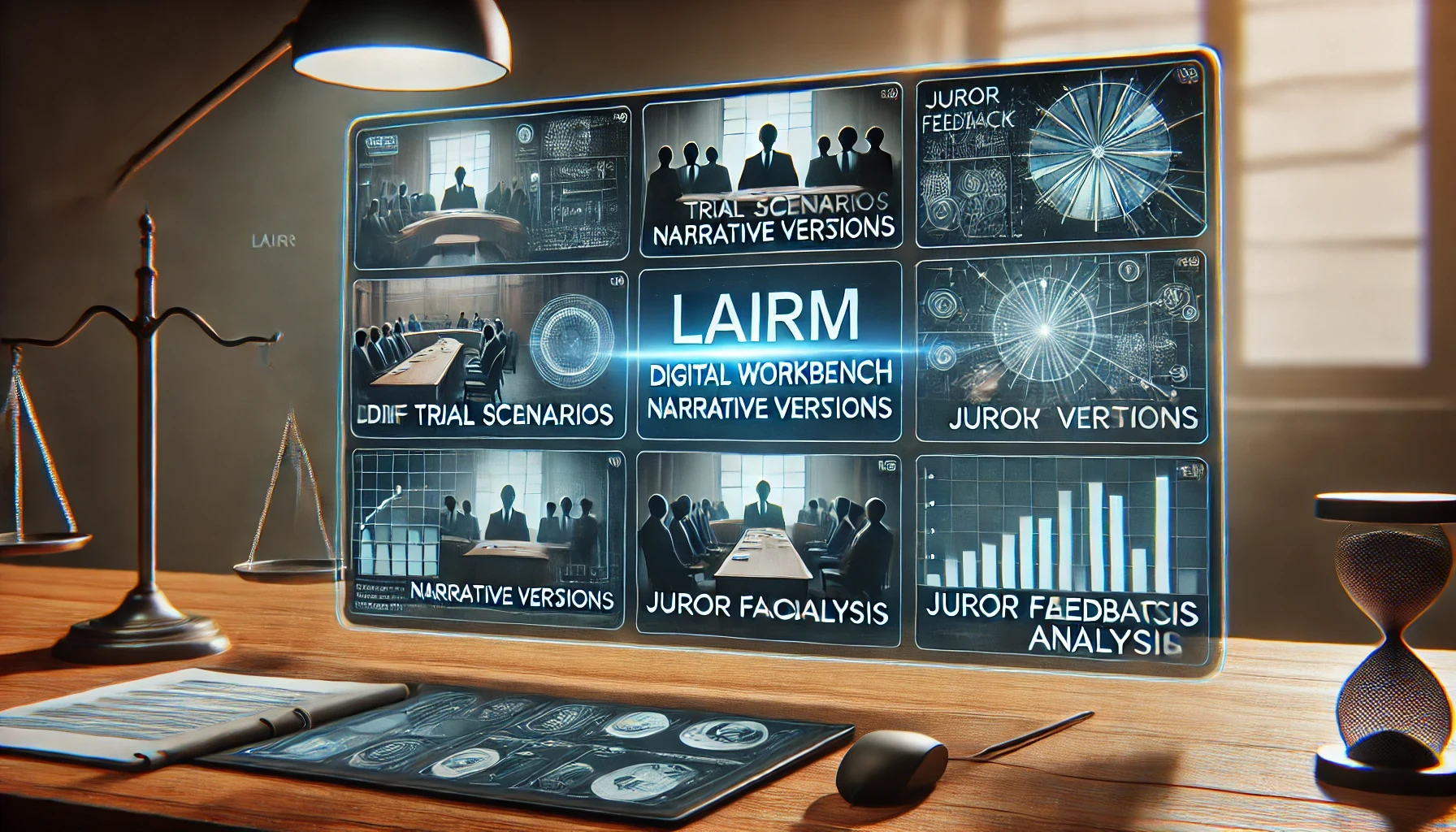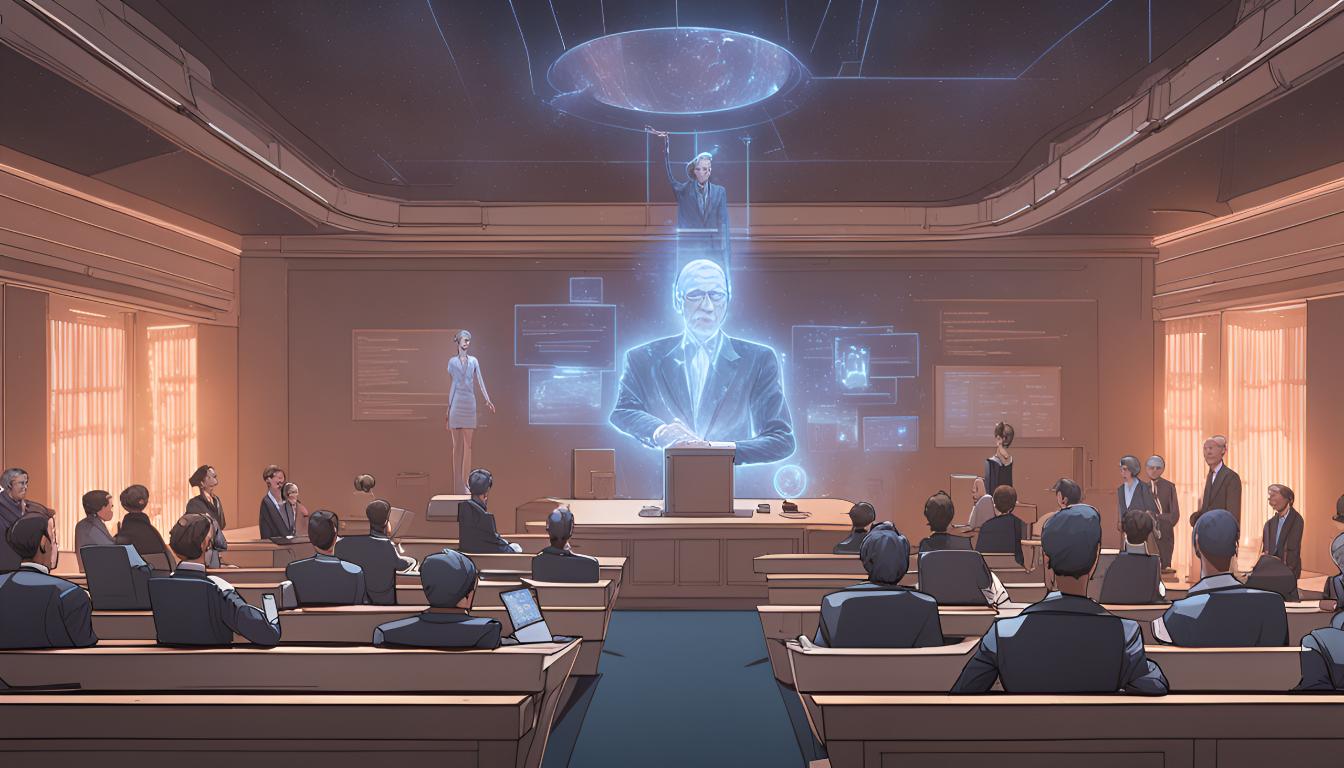Beyond the Verdict: How AI-Powered Focus Groups Are Redefining Trial Preparation
Nov 6, 2024

In the realm of trial preparation, focus groups have always been a powerful tool for attorneys. Picture an attorney sitting in a room with a group of individuals, analyzing their expressions and interactions to get a glimpse into the minds of potential jurors, noticing their furrowed brows, nods, and subtle shifts in posture. By providing insights into how potential jurors might perceive the case, focus groups help attorneys fine-tune their arguments, uncover potential weaknesses, and refine their narrative strategy. However, the traditional approach to focus groups is limited by time, cost, and logistical challenges. This is where artificial intelligence (AI) is stepping in to revolutionize focus groups, offering a level of precision, adaptability, and insight that was previously unimaginable. Use cases demonstrate over 30% increases in awards and hundreds of hours saved.
AI-driven focus groups are a game-changer for trial consultants,paralegals and lawyers, allowing them to test and iterate their narratives more efficiently. For example, what used to take weeks now takes just hours or even minutes, enabling a faster turnaround and deeper insights into juror reactions. As one trial consultant put it, 'AI has completely changed the way we approach focus groups—what used to take weeks now takes hours, and the depth of insight we gain is unmatched.' By using custom built legal AI technology, trial preparation becomes more dynamic, data-driven, and strategic, ensuring that every aspect of the case is tailored for maximum impact. Let’s explore how AI, especially through advanced systems like Lairm, is transforming focus groups and making them an indispensable asset in the modern courtroom.
The Power of AI in Focus Group Analysis
The traditional focus group involves gathering a representative group of people, presenting the case to them, and analyzing their reactions. While effective, these focus groups are inherently limited. They are snapshots—single points of feedback that provide valuable but static insights. In contrast, AI-driven focus groups provide an iterative and continuous feedback loop, allowing attorneys to adjust their approach multiple times before a case even reaches the courtroom. SyntheticJuror's patented synthetic being AI technology further enhances these focus groups by allowing vast customization of juror simulations based on hundreds of variable conditions. For instance, attorneys preparing for a trial in Texas can create simulations tailored to reflect regional attitudes and biases, leading to more relevant and realistic insights. This geo-specific variable provides attorneys with insights that are more representative of the actual jury pool they might face, making trial preparation even more precise and impactful.
In addition to geographic controls, the technology offers powerful demographic, sentiment, and psychographic adjustments. Attorneys can customize focus groups based on demographics such as age, gender, occupation, and socioeconomic status, ensuring that the simulated jurors reflect the characteristics of the actual jury pool. Sentiment analysis helps attorneys gauge emotional reactions, allowing them to fine-tune the tone and delivery of their arguments to evoke the desired response. Psychographic profiling adds another layer, enabling attorneys to understand juror attitudes, values, and beliefs, and adapt their narrative to better resonate with different personality types. These advanced controls allow for a highly tailored and effective trial preparation process, giving attorneys the tools to create narratives that deeply connect with jurors on multiple levels. In one case, using these advanced adjustments led to a more favorable juror response, ultimately helping the attorney secure a successful verdict. These are but just a few of the advanced controls that are part of a private Lairm focus group template, offering endless possibilities for refining and customizing trial preparation strategies.
AI systems like SyntheticJuror's Lairm help streamline and enhance the focus group process. By integrating predictive analytics, AI can simulate multiple focus groups in a fraction of the time it would take to conduct a traditional one. This means attorneys get immediate insights into how different versions of their opening statements, evidence presentations, and closing arguments resonate with potential jurors. AI turns trial preparation from a one-shot assessment into a continually evolving, iterative process.
Lairm: The AI Workbench and Worker
Lairm is not just an AI tool—it’s both an AI workbench and an AI worker, making it an integral part of any modern trial preparation. Imagine an attorney using Lairm to run simulations late into the night, testing different ways to present key evidence until the perfect approach is found. The next day, they use Lairm's insights to refine their strategy further, ensuring every detail is aligned to engage the jury effectively. As an AI workbench, Lairm provides a sophisticated private platform where trial consultants, paralegals, and lawyers can create, test, and refine every part of their case. It offers a private personal digital space where attorneys can simulate different trial scenarios, test various narrative versions, and assess how different juror profiles might respond to each approach.
As an AI worker, SJ's Lairm actively processes data, runs simulations, and analyzes juror reactions to provide actionable insights. A stakeholder can have many AI workers working on different aspects of a case simultaneously, ensuring that each part of the preparation is optimized efficiently. Lairm takes on the heavy lifting of data analysis, allowing trial consultants, lawyers, and paralegals to focus on strategic decisions rather than being bogged down by the logistics of running multiple focus groups, looking up twitter feeds, reviewing new case decisions and so on. Lairm works tirelessly to identify which elements of the narrative resonate most and which need further adjustment, providing attorneys with a constantly refined version of their case.
Importantly, Lairm serves as a private, protected repository of specialized knowledge for the attorney. All insights, simulations, and refined narratives developed through Lairm are secured, accessible only to the lawyer and their designated team members. This ensures that attorneys have a unique edge, maintaining complete control over their strategies and intellectual property. It’s not just about having a powerful tool—it’s about having an exclusive, personalized resource that enhances trial preparation while keeping critical information secure.

Perfecting the Focus Group Format with AI: Opening Statement, Evidence, and Deliberation
AI is reshaping not only how focus groups are conducted but also the very structure of these sessions, particularly in three key areas: the Opening Statement, the Evidence presentation, and Deliberation/Closing Statements. SyntheticJuor AI tools help attorneys perfect each of these components by using data-driven insights to refine the approach.
1. Opening Statement: Setting the Tone with Precision
The opening statement is critical in trial preparation—it sets the tone and frames the story. For instance, one trial consultant shared how an AI-driven focus group helped them realize that a subtle shift in the opening line—from a straightforward introduction to an emotionally charged anecdote—dramatically improved juror engagement. 'It was like night and day,' the consultant said, 'The emotional hook drew them in immediately.' AI-powered focus groups like SJ, allow attorneys to test multiple versions of their opening statements, each with slightly different emphases or language, to determine which version resonates most effectively. The AI then analyzes the feedback, highlighting which parts of the statement are compelling and which need adjustment. This iterative process helps attorneys find the 'diamond in the rough'—the version of the opening statement that connects best with jurors and sets the stage for the rest of the trial.
With SyntheticJuror AI technology , trial consultants can also tailor opening statements to different demographic groups or individual juror profiles, ensuring that the story resonates on a deeper level. AI enables attorneys to quickly adapt their message based on diverse feedback, which means they can test numerous iterations, each designed to target specific demographic traits, personality types, or biases. This adaptability provides a strategic advantage, allowing attorneys to craft an opening statement that not only informs but also emotionally connects with jurors in a way that traditional focus groups simply can't provide with the same speed or precision.
2. Evidence Presentation: Highlighting What Matters Most
When it comes to presenting evidence, AI-driven focus groups excel at identifying which pieces of evidence jurors find most compelling or confusing. Traditional focus groups might highlight these aspects after the fact, but AI provides real-time analysis that can immediately inform how evidence should be presented. Attorneys can refine their strategy based on AI-generated feedback—such as focusing more on visual aids, simplifying complex testimony, or emphasizing particular exhibits that have the greatest emotional impact.
Lairm's capabilities in predictive analytics also enable attorneys to anticipate juror reactions to different pieces of evidence, providing insights into which aspects of the evidence are likely to resonate or fall flat. By iterating through different versions of evidence presentation, Lairm helps attorneys experiment with various techniques, such as adjusting the order of evidence, enhancing visual aids, or modifying the tone of delivery. This iterative process allows for continual refinement until the presentation is optimized to engage jurors fully and ensure that the narrative remains both impactful and cohesive. Moreover, AI can predict potential points of confusion or emotional disconnect, guiding attorneys to preemptively address these issues to maintain a compelling narrative flow.
3. Deliberation and Closing Statements: Crafting the Perfect Ending
The deliberation phase is crucial for understanding how jurors perceive the case as a whole. AI-driven focus groups can simulate jury deliberations, providing insights into how jurors might debate the case, which arguments hold the most weight, and where there might be room for doubt. For example, during one simulated deliberation, a minor piece of evidence that had initially seemed insignificant became the focal point of juror discussions, prompting the attorney to reinforce that element in the real trial. For example, AI simulations often reveal unexpected points of contention—like a seemingly minor piece of evidence that ends up dominating juror discussions. This level of insight helps attorneys identify the strongest elements of their case and shore up any weaknesses before trial.
For closing statements, SyntheticJuror AI tools like Lairm analyze juror feedback to refine how attorneys should summarize their arguments and reinforce key emotional moments. The closing statement is the final opportunity to make a lasting impression, and AI ensures that every word and sentiment is perfectly calibrated to leave jurors with the most compelling version of the narrative. By iterating and refining the closing argument based on simulated deliberations, attorneys can craft a closing that ties together the emotional and factual components of the case in a way that resonates deeply with jurors.

AI as a Strategic Partner in Focus Group Analysis
AI doesn’t just provide insights—it becomes a strategic partner in trial preparation. Picture an attorney running early simulations that highlight gaps in the evidence, prompting them to adjust their discovery strategy to gather more impactful documents and testimony. By continuously refining the narrative through iterative focus groups, AI systems like Lairm empower attorneys to enter the courtroom with the best possible version of their case. The ability to simulate different juror reactions, adjust on the fly, and adapt to different personalities makes AI an invaluable tool for modern trial consultants.
Beyond the traditional phases of opening, evidence, and closing, AI can also help attorneys think proactively about their narrative. Early simulations can guide discovery by highlighting gaps or opportunities that need further exploration, helping to ensure that attorneys gather the right documents and testimony to build a stronger case.
Looking Forward: The Future of AI-Driven Focus Groups
As AI technology continues to advance, the possibilities for transforming trial preparation are endless. Imagine a future where AI can provide real-time feedback during an actual trial—analyzing jurors' facial expressions and body language to help attorneys adjust their strategy mid-trial. Picture an attorney noticing a dip in juror engagement during a key testimony, and, with AI insights, pivoting the argument or emphasizing different evidence to re-capture attention. Or consider the potential for AI to tailor focus group simulations based on individual juror profiles, providing highly personalized insights that make the narrative even more compelling.
AI-driven focus groups are more than just an upgrade—they are a revolution in how trial preparation is conducted. By turning static snapshots into dynamic, evolving insights, AI ensures that attorneys are always a step ahead, always refining, and always ready to present the best possible case. For trial consultants and attorneys willing to embrace this technology, the future of trial preparation is bright, precise, and profoundly impactful.
Lairm as Part of the SyntheticJuror Suite of Justice Tools
Lairm is a key component of the SyntheticJuror suite of justice tools, used by trial consultants, paralegals, and lawyers to elevate trial preparation. By providing a blend of AI workbench capabilities and AI-driven worker insights, Lairm helps legal teams create compelling narratives, refine strategies, and ensure that every aspect of their case is presented in the most effective way possible. Together with other tools in the SyntheticJuror suite, Lairm empowers legal professionals to craft persuasive, data-driven stories that resonate with jurors and drive successful outcomes.
Lairm also serves as a lawyer's private, protected source of specialized knowledge. The insights generated, simulations run, and refined strategies developed through Lairm are accessible only to the attorney and their authorized team members. This ensures that every competitive advantage gained through Lairm remains confidential and under the attorney’s control, providing a unique, powerful edge in trial preparation.
